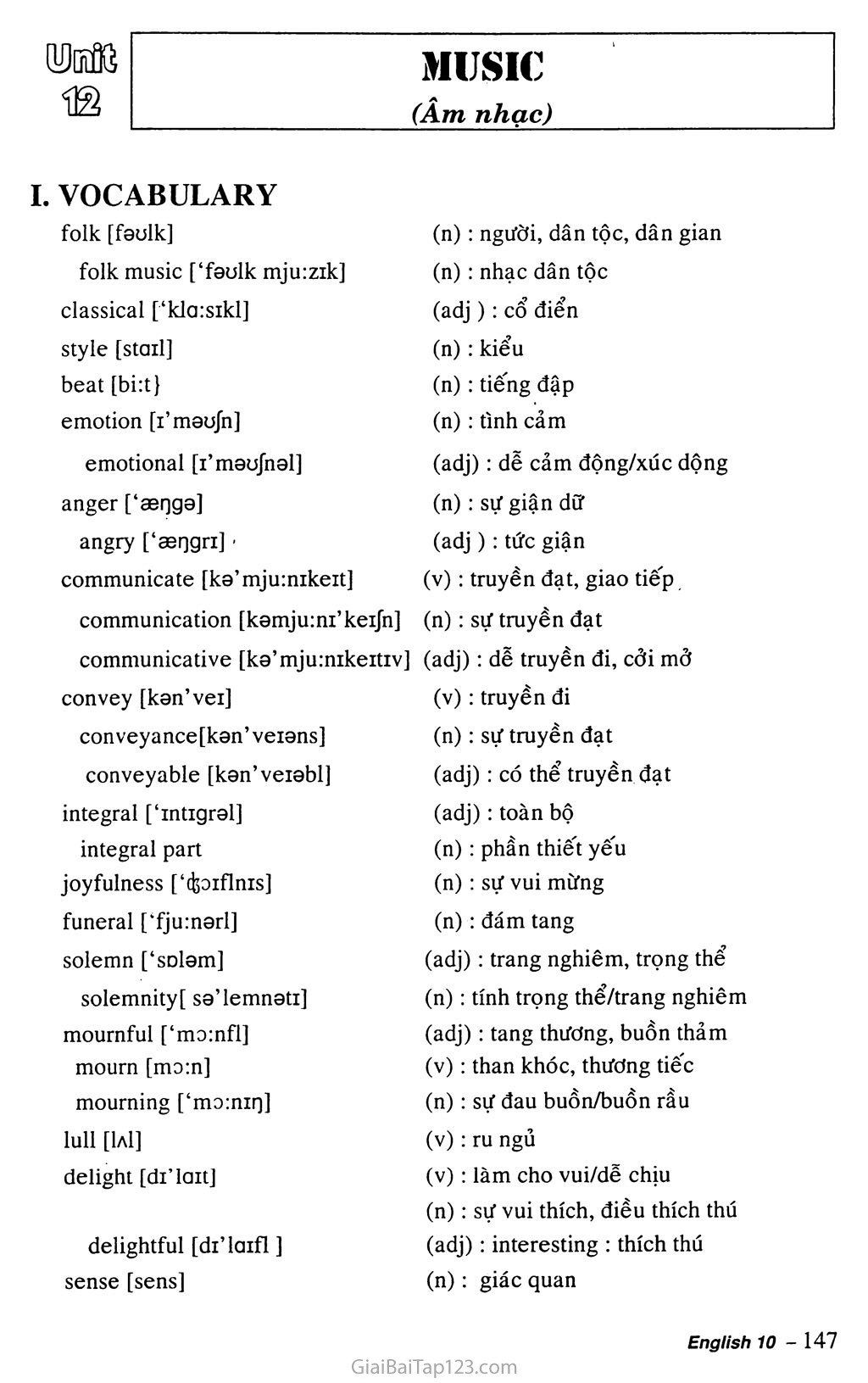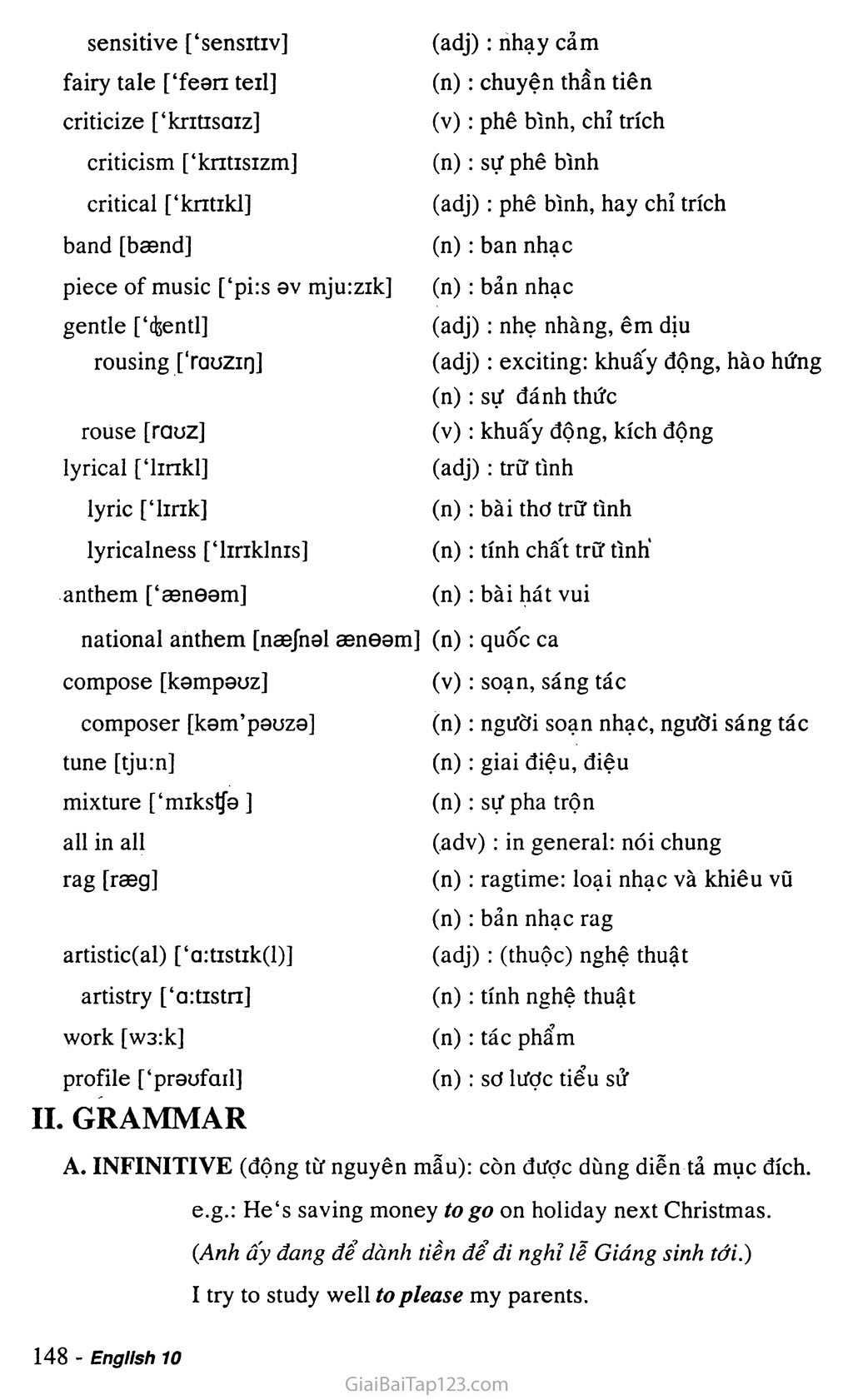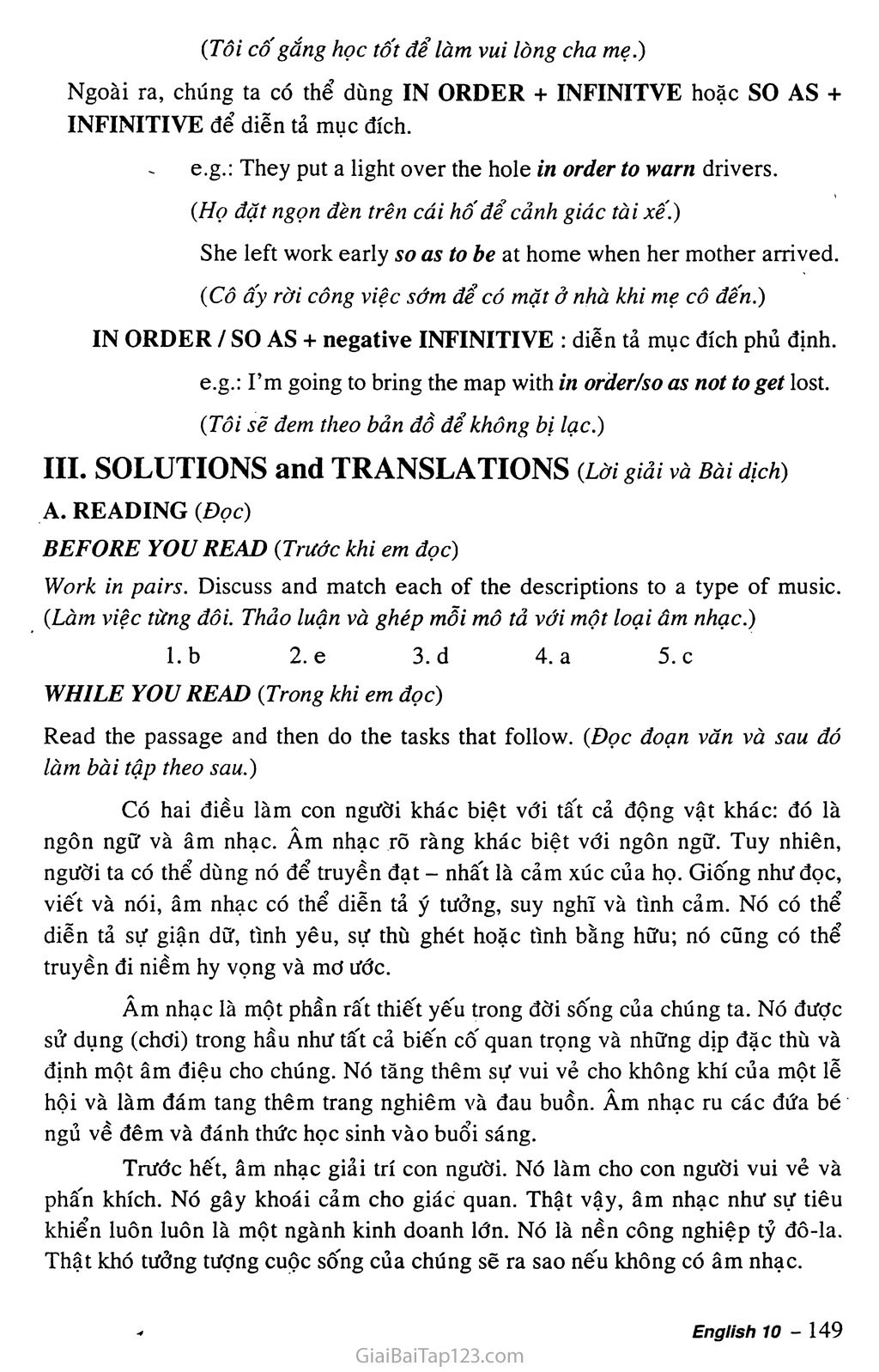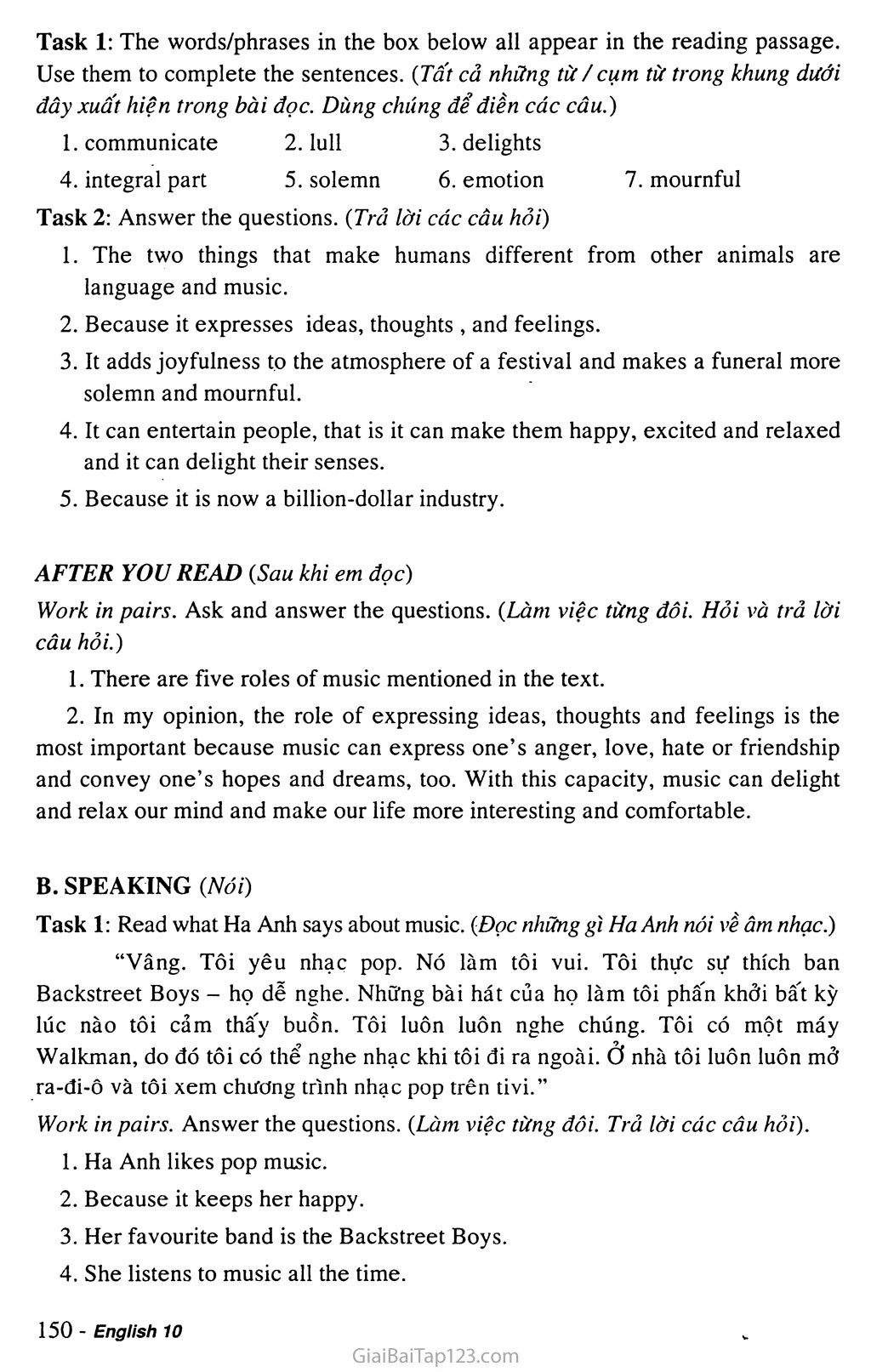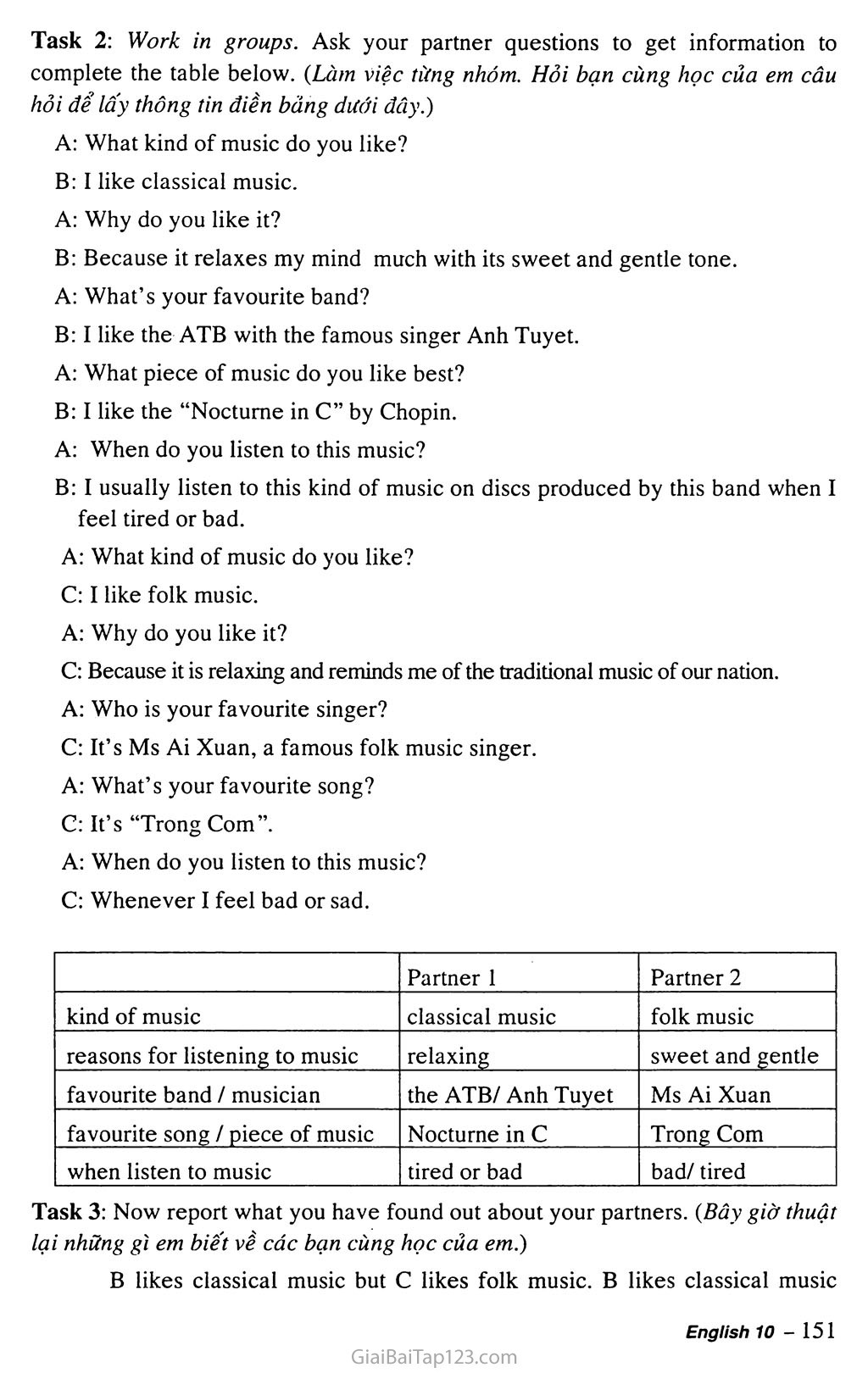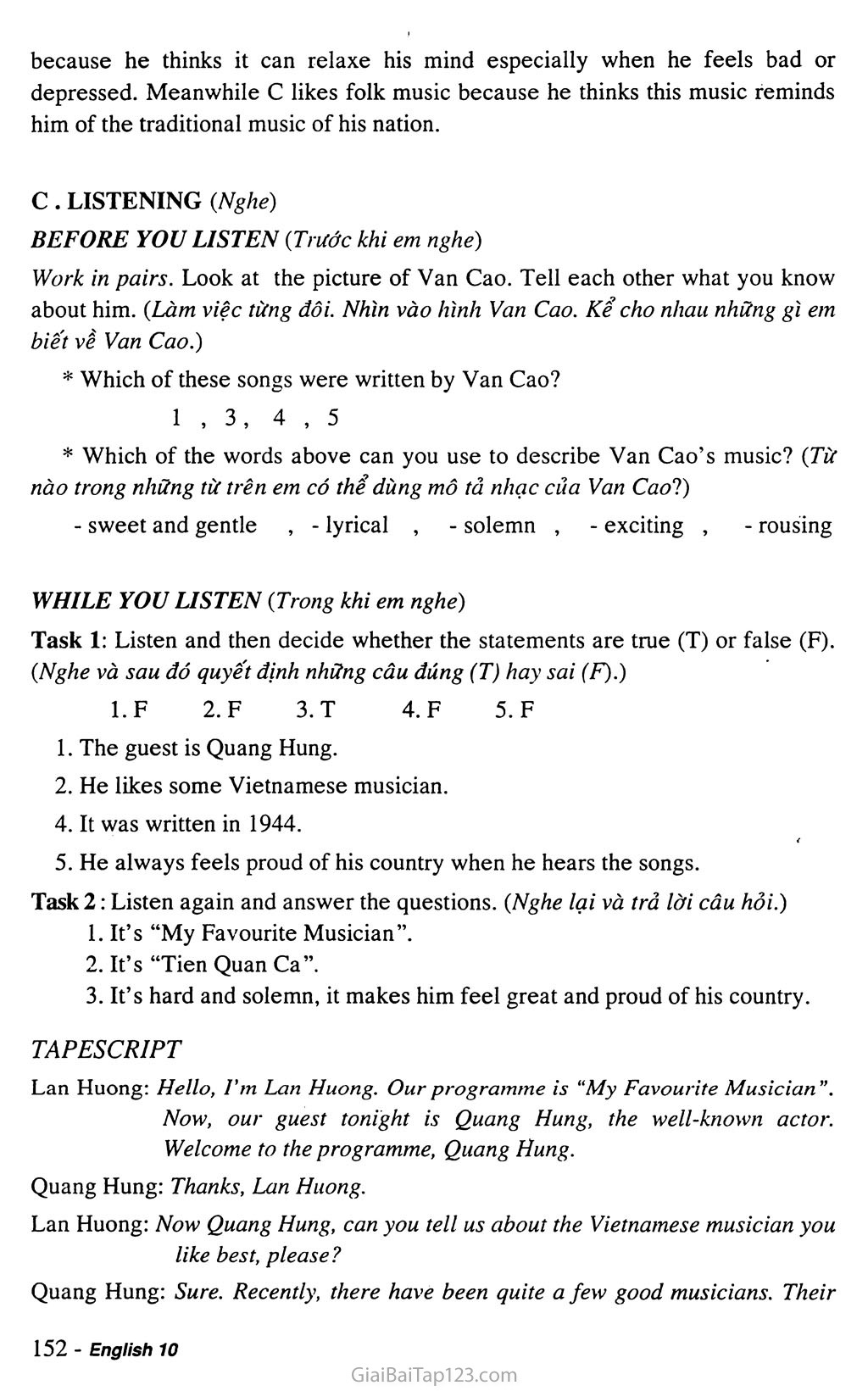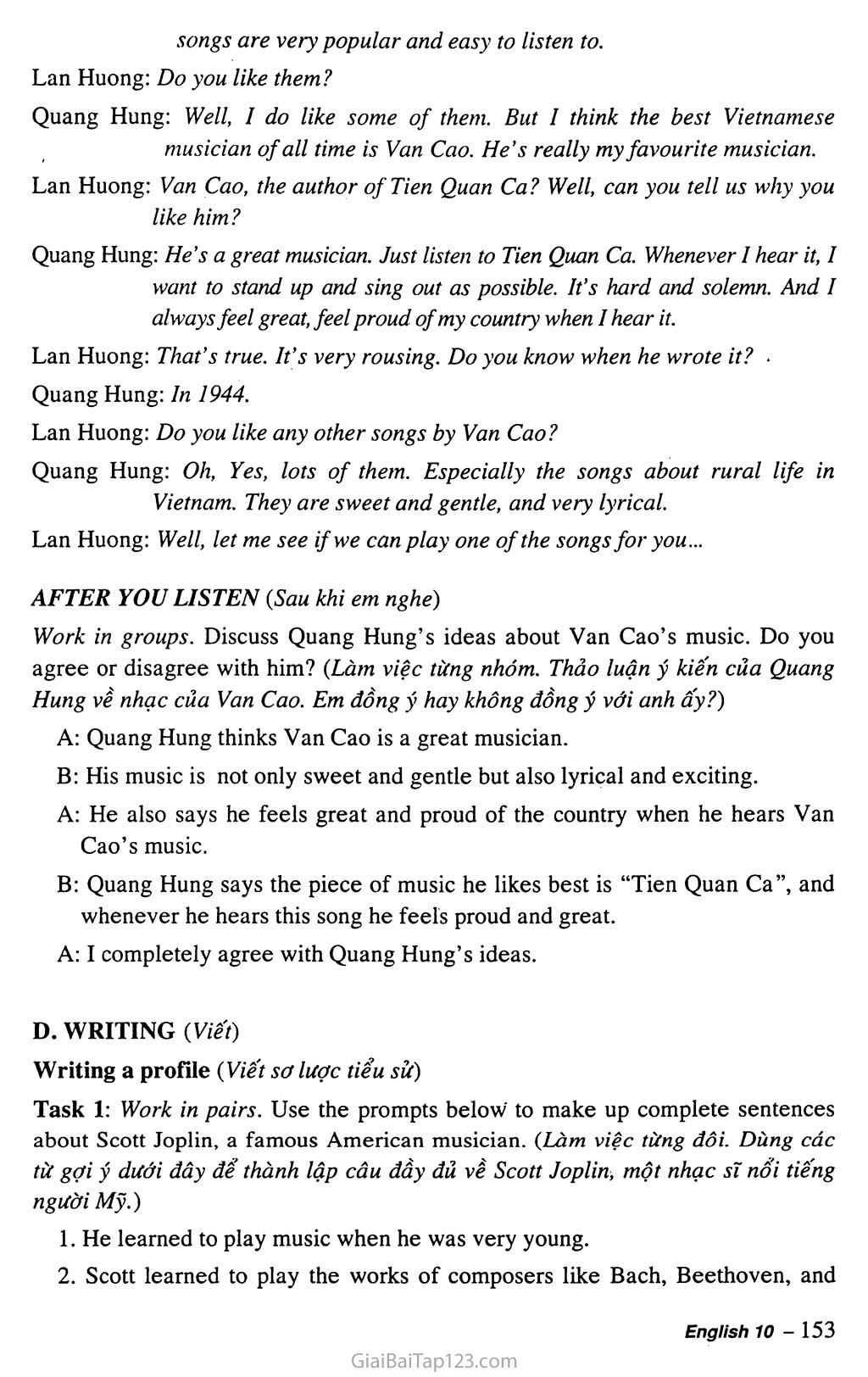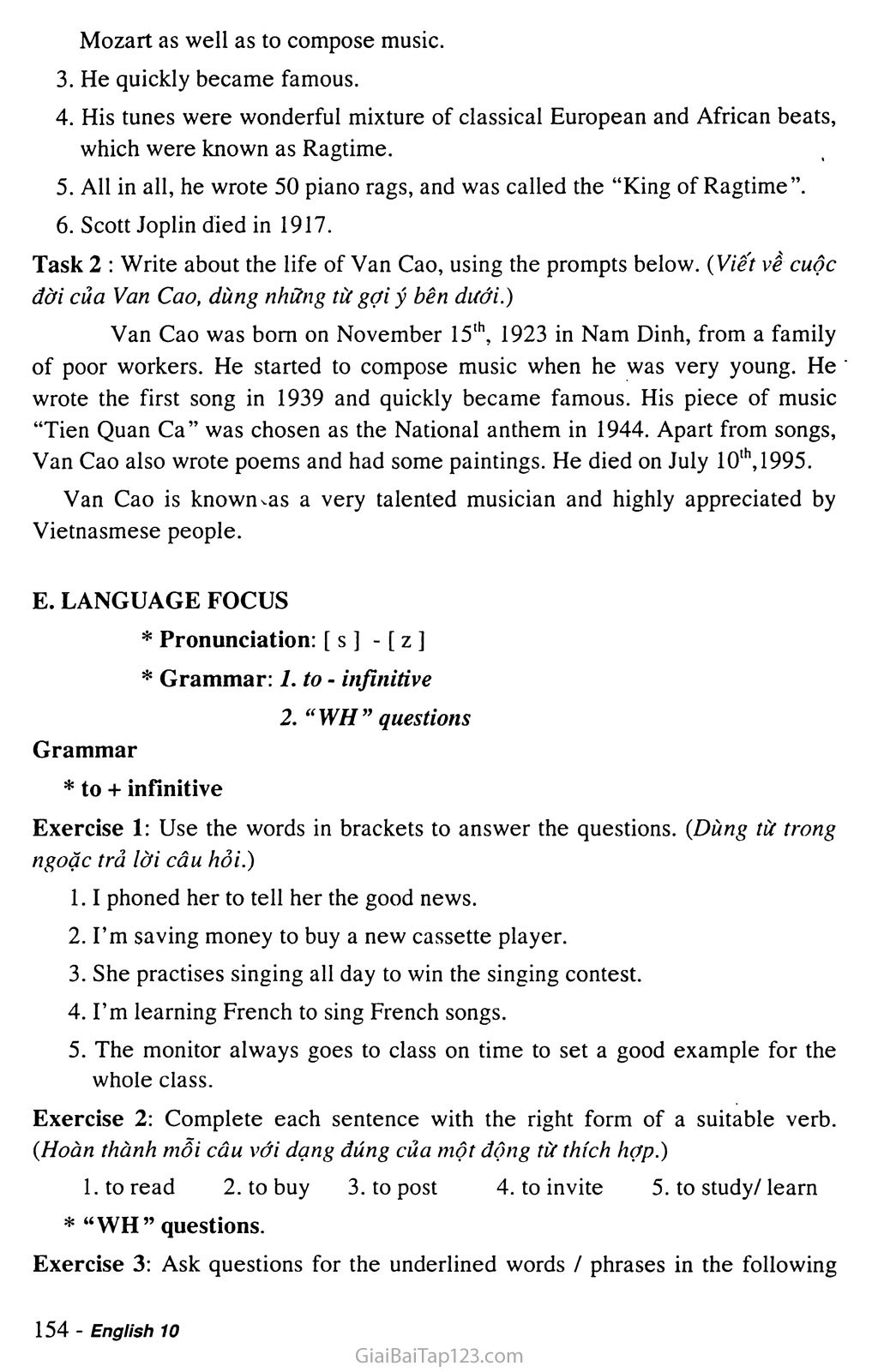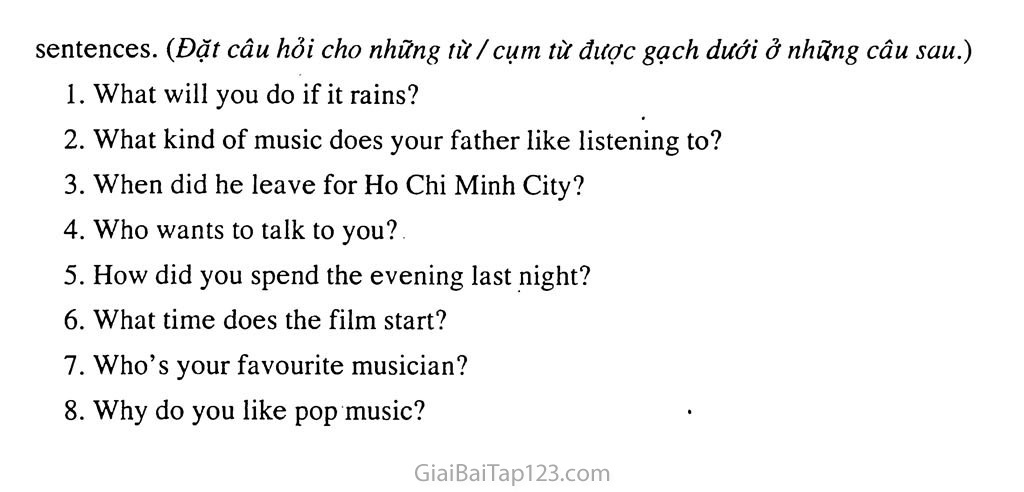Giải tiếng Anh lớp 10 Unit 12: Music
MUSIC
(Ảm nhạc)
I. VOCABULARY
folk [faulk]
(n) : người, dân tộc, dân gian
folk music [‘faolk mju:zik]
(n) : nhạc dân tộc
classical [lkla:sikl]
(adj) : cổ điển
style [stall]
(n) : kiểu
beat [bi:t]
(n) : tiếng đập
emotion [I’maufn]
(n) : tình cảm
emotional [I’maufnal]
(adj) : dễ cảm động/xúc dộng
anger [‘aeqga]
(n) : sự giận dữ
angry [‘serjgri] '
(adj) : tức giận
communicate [ka’mjumikeit]
(v) : truyền đạt, giao tiếp
communication [kamjumi’keijn]
(n) : sự truyền đạt
communicative [ka’mjumikeitiv]
(adj) : dễ truyền đi, cởi mở
convey [kan’vei]
(v) : truyền đi
conveyance[kan’ veians]
(n) : sự truyền đạt
conveyable [kan’veiabl]
(adj): có thể truyền đạt
integral [‘intigral]
(adj): toàn bộ
integral part
(n) : phần thiết yếu
joyfulness [‘(feoiflnis]
(n) : sự vui mừng
funeral [‘fjumarl]
(n) : đám tang
solemn [‘sDlam]
(adj) : trang nghiêm, trọng thể
solemnity[ sa’Iemnati]
(n): tính trọng thể/trang nghiêm
mournful [‘mo:nfl]
(adj) : tang thương, buồn thảm
mourn [mo:n]
(v): than khóc, thương tiếc
mourning [‘mo:niq]
(n): sự đau buồn/buồn rầu
lull [lAl]
(v) : ru ngủ
delight [di'laitj
(v) : làm cho vui/dễ chịu
(n) : sự vui thích, điều thích thú
delightful [di’laifl ]
(adj): interesting : thích thú
sense [sens]
(n) : giác quan
sensitive [‘sensitiv] fairy tale [‘fesn tell] criticize [‘kritisaiz]
criticism [‘kntisizm] critical [‘kritikl]
band [baend]
piece of music [‘pi:s SV mjmzik] gentle [‘tfeentl]
rousing [‘raozir)]
rouse [raoz] lyrical [‘linkl] lyric [‘link]
lyricalness [‘liriklms] anthem [‘aenesm]
(adj) : nhạy cảm
(n): chuyện thần tiên
(v) : phê bình, chỉ trích
(n): sự phê bình
(adj) : phê bình, hay chỉ trích
(n) : ban nhạc
(n) : bản nhạc
(adj) : nhẹ nhàng, êm dịu
(adj) : exciting: khuấy động, hào hứng
(n):sự đánh thức
(v) : khuấy động, kích động
(adj) : trữ tình
(n)
(n)
(n)
bài thơ trữ tình tính chát trữ tình' bài hát vui
national anthem [nasfnsl asnesm] compose [ksmpsuz]
composer [ksm’psuzs] tune [tju:n] mixture [‘mikstfs ] all in all rag [raeg]
artistic(al) [‘a:tistik(l)] artistry [*a:tistn]
work [W3:k] profile [‘prsufail]
II. GRAMMAR
(n) :quốc ca
(v) : soạn, sáng tác
(n) : người soạn nhạc, người sáng tác
(n) : giai điệu, điệu
(n) : sự pha trộn
(adv) : in general: nói chung
(n) : ragtime: loại nhạc và khiêu vũ
(n) : bản nhạc rag
(adj) : (thuộc) nghệ thuật
(n) : tính nghệ thuật
(n) : tác phẩm
(n) : sơ lược tiểu sử
A. INFINITIVE (động từ nguyên mẫu): còn được dùng diễn tả mục đích, e.g.: He‘s saving money to go on holiday next Christmas. (Anh ấy đang để dành tiền để đi nghỉ lễ Giáng sinh tới.)
I try to study well to please my parents.
{Tôi cô'gắng học tốt để làm vui lòng cha mẹ.)
Ngoài ra, chúng ta có thể dùng IN ORDER + INFINITVE hoặc so AS + INFINITIVE để diễn tả mục đích.
e.g.: They put a light over the hole in order to warn drivers.
{Họ đặt ngọn đèn trên cái hố để cảnh giác tài xế.)
She left work early so as to be at home when her mother arrived.
{Cô ấy rời công việc sớm để có mặt ở nhà khi mẹ cô đến.)
IN ORDER / SO AS + negative INFINITIVE : diễn tả mục đích phủ định.
e.g.: I’m going to bring the map with in order/so as not to get lost. {Tôi sẽ đem theo bản đồ để không bị lạc.)
III. SOLUTIONS and TRANSLATIONS {Lời giải và Bài dịch)
A. READING {Đọc)
BEFORE YOU READ {Trước khi em đọc)
Work in pairs. Discuss and match each of the descriptions to a type of music. {Làm việc từng đôi. Thảo luận và ghép mỗi mô tả với một loại âm nhạc.)
b 2. e 3. d 4. a 5. c
WHILE YOU READ {Trong khi em đọc)
Read the passage and then do the tasks that follow. {Đọc đoạn văn và sau đó làm bài tập theo sau.)
Có hai điều làm con người khác biệt với tất cả động vật khác: đó là ngôn ngữ và âm nhạc. Âm nhạc rõ ràng khác biệt với ngôn ngữ. Tuy nhiên, người ta có thể dùng nó để truyền đạt - nhát là cảm xúc của họ. Giông như đọc, viết và nói, âm nhạc có thể diễn tả ý tưởng, suy nghĩ và tình cảm. Nó có thể diễn tả sự giận dữ, tình yêu, sự thù ghét hoặc tình bằng hữu; nó cũng có thể truyền đi niềm hy vọng và mơ ước.
Âm nhạc là một phần rất thiết yếu trong đời sông của chúng ta. Nó được sử dụng (chơi) trong hầu như tất cả biến cố quan trọng và những dịp đặc thù và định một âm điệu cho chúng. Nó tăng thêm sự vui vẻ cho không khí của một lễ hội và làm đám tang thêm trang nghiêm và đau buồn. Âm nhạc ru các đứa bé ngủ về đêm và đánh thức học sinh vào buổi sáng.
Trước hết, âm nhạc giải trí con người. Nó làm cho con người vui vẻ và phấn khích. Nó gây khoái cảm cho giác quan. Thật vậy, âm nhạc như sự tiêu khiển luôn luôn là một ngành kinh doanh lớn. Nó là nền công nghiệp tỷ đô-la. Thật khó tưởng tượng cuộc sống của chúng sẽ ra sao nếu không có âm nhạc.
Task 1: The words/phrases in the box below all appear in the reading passage. Use them to complete the sentences. (Tất cả những từ / cụm từ trong khung dưới đây xuất hiện trong bài đọc. Dùng chúng để điền các câu.)
communicate 2. lull 3. delights
4. integral part 5. solemn 6. emotion 7. mournful
Task 2: Answer the questions. (7ra lời các cầu hỏi)
The two things that make humans different from other animals are language and music.
Because it expresses ideas, thoughts , and feelings.
It adds joyfulness to the atmosphere of a festival and makes a funeral more solemn and mournful.
It can entertain people, that is it can make them happy, excited and relaxed and it can delight their senses.
Because it is now a billion-dollar industry.
AFTER YOU READ (Sau khi em đọc)
Work in pairs. Ask and answer the questions. (Làm việc từng đôi. Hỏi và trả lời câu hỏi.)
There are five roles of music mentioned in the text.
In my opinion, the role of expressing ideas, thoughts and feelings is the most important because music can express one’s anger, love, hate or friendship and convey one’s hopes and dreams, too. With this capacity, music can delight and relax our mind and make our life more interesting and comfortable.
B. SPEAKING (Nói)
Task 1: Read what Ha Anh says about music. (Đọc những gì Ha Anh nói về âm nhạc.) “Vâng. Tôi yếu nhạc pop. Nó làm tôi vui. Tôi thực sự thích ban
Backstreet Boys - họ dễ nghe. Những bài hát của họ làm tôi phân khởi bất kỳ lúc nào tôi cảm thây buồn. Tôi luôn luôn nghe chúng. Tôi có một máy Walkman, do đó tôi có thể nghe nhạc khi tôi đi ra ngoài. Ớ nhà tôi luôn luôn mở ra-đi-ô và tôi xem chương trình nhạc pop trên ti vi.”
Work in pairs. Answer the questions. (Làm việc từng đôi. Trả lời các câu hỏi).
Ha Anh likes pop music.
Because it keeps her happy.
Her favourite band is the Backstreet Boys.
She listens to music all the time.
Task 2: Work in groups. Ask your partner questions to get information to complete the table below. (Làm việc từng nhóm. Hỏi bạn cùng học của em câu hỏi để lấy thông tin điền bủng dưới đây.)
A: What kind of music do you like?
B: I like classical music.
A: Why do you like it?
B: Because it relaxes my mind much with its sweet and gentle tone.
A: What’s your favourite band?
B: I like the ATB with the famous singer Anh Tuyet.
A: What piece of music do you like best?
B: I like the “Nocturne in C” by Chopin.
A: When do you listen to this music?
B: I usually listen to this kind of music on discs produced by this band when I feel tired or bad.
A: What kind of music do you like?
C: I like folk music.
A: Why do you like it?
C: Because it is relaxing and reminds me of the traditional music of our nation.
A: Who is your favourite singer?
C: It’s Ms Ai Xuan, a famous folk music singer.
A: What’s your favourite song?
C: It’s “Trong Com”.
A: When do you listen to this music?
C: Whenever I feel bad or sad.
Partner 1
Partner 2
kind of music
classical music
folk music
reasons for listening to music
relaxing
sweet and gentle
favourite band / musician
the ATB/ Anh Tuyet
Ms Ai Xuan
favourite song / piece of music
Nocturne in c
Trong Com
when listen to music
tired or bad
bad/ tired
Task 3: Now report what you have found out about your partners. (Bây giờ thuật lại những gì em biết về các bạn cùng học của em.)
B likes classical music but c likes folk music. B likes classical music
because he thinks it can relaxe his mind especially when he feels bad or depressed. Meanwhile c likes folk music because he thinks this music reminds him of the traditional music of his nation.
c . LISTENING {Nghe)
BEFORE YOU LISTEN {Trước khi em nghe)
Work in pairs. Look at the picture of Van Cao. Tell each other what you know about him. {Làm việc từng đôi. Nhìn vào hình Van Cao. Kể cho nhau những gì em biết về Van Cao.)
Which of these songs were written by Van Cao?
1 , 3, 4 , 5
Which of the words above can you use to describe Van Cao’s music? {Từ nào trong những từ trên em có thể dùng mô tả nhạc của Van Cao?)
- sweet and gentle , - lyrical , - solemn , - exciting , - rousing
WHILE YOU LISTEN {Trong khi em nghe)
Task 1: Listen and then decide whether the statements are true (T) or false (F). {Nghe và sau đó quyết định những câu đúng (T) hay sai (E).)
F 2.F 3.T 4. F 5. F
The guest is Quang Hung.
He likes some Vietnamese musician.
It was written in 1944.
f
He always feels proud of his country when he hears the songs.
Task 2: Listen again and answer the questions. {Nghe lại và trả lời câu hỏi.)
It’s “My Favourite Musician”.
It’s “Tien Quan Ca”.
It’s hard and solemn, it makes him feel great and proud of his country.
TAPESCRIPT
Lan Huong: Hello, I’m Lan Huong. Our programme is “My Favourite Musician”.
Now, our guest tonight is Quang Hung, the well-known actor. Welcome to the programme, Quang Hung.
Quang Hung: Thanks, Lan Huong.
Lan Huong: Now Quang Hung, can you tell US about the Vietnamese musician you like best, please?
Quang Hung: Sure. Recently, there have been quite a few good musicians. Their
songs are very popular and easy to listen to.
Lan Huong: Do you like them?
Quang Hung: Well, I do like some of them. But I think the best Vietnamese musician of all time is Van Cao. He’s really my favourite musician.
Lan Huong: Van Cao, the author of Tien Quan Ca? Well, can you tell US why you like him?
Quang Hung: He’s a great musician. Just listen to Tien Quan Ca. Whenever I hear it, I want to stand up and sing out as possible. It’s hard and solemn. And I always feel great, feel proud of my country when I hear it.
Lan Huong: That’s true. It’s very rousing. Do you know when he wrote it? ■
Quang Hung: In 1944.
Lan Huong: Do you like any other songs by Van Cao?
Quang Hung: Oh, Yes, lots of them. Especially the songs about rural life in Vietnam. They are sweet and gentle, and very lyrical.
Lan Huong: Well, let me see if we can play one of the songs for you...
AFTER YOU LISTEN (Sau khi em nghe)
Work in groups. Discuss Quang Hung’s ideas about Van Cao’s music. Do you agree or disagree with him? (Làm việc từng nhóm. Thảo luận ý kiến của Quang Hung về nhạc của Van Cao. Em đồng ỷ hay không đồng ý với anh ấy?)
A: Quang Hung thinks Van Cao is a great musician.
B: His music is not only sweet and gentle but also lyrical and exciting.
A: He also says he feels great and proud of the country when he hears Van
Cao’s music.
B: Quang Hung says the piece of music he likes best is “Tien Quan Ca”, and whenever he hears this song he feels proud and great.
A: I completely agree with Quang Hung’s ideas.
D. WRITING (Viet)
Writing a profile (Viết sơ lược tiểu sử)
Task 1: Work in pairs. Use the prompts below to make up complete sentences about Scott Joplin, a famous American musician. (Làm việc từng đôi. Dùng các từ gợi ỷ dưới đây để thành lập câu đầy đủ về Scott Joplin, một nhạc sĩ nôi tiếng người Mỹ.)
He learned to play music when he was very young.
Scott learned to play the works of composers like Bach, Beethoven, and
Mozart as well as to compose music.
He quickly became famous.
His tunes were wonderful mixture of classical European and African beats, which were known as Ragtime.
All in all, he wrote 50 piano rags, and was called the “King of Ragtime”.
Scott Joplin died in 1917.
Task 2 : Write about the life of Van Cao, using the prompts below. (Viết về cuộc đời của Van Cao, dùng những từ gợi ý bên dưới.)
Van Cao was bom on November 15th, 1923 in Nam Dinh, from a family of poor workers. He started to compose music when he was very young. He wrote the first song in 1939 and quickly became famous. His piece of music “Tien Quan Ca” was chosen as the National anthem in 1944. Apart from songs, Van Cao also wrote poems and had some paintings. He died on July 10th, 1995.
Van Cao is known.as a very talented musician and highly appreciated by Vietnasmese people.
E. LANGUAGE FOCUS
Pronunciation: [ s ] - [ z ]
Grammar: 1. to - infinitive
“WH” questions
Grammar
to + infinitive
Exercise 1: Use the words in brackets to answer the questions. (Dùng từ trong ngoặc trả lời câu hỏi.)
1.1 phoned her to tell her the good news.
I’m saving money to buy a new cassette player.
She practises singing all day to win the singing contest.
I’m learning French to sing French songs.
The monitor always goes to class on time to set a good example for the whole class.
Exercise 2: Complete each sentence with the right form of a suitable verb. (Hoàn thành mỗi câu với dạng đúng của một động từ thích hợp.)
to read 2. to buy 3. to post 4. to invite 5. to study/ learn
“WH” questions.
Exercise 3: Ask questions for the underlined words / phrases in the following
sentences. (Đặt câu hỏi cho những từ/cụm từ được gạch dưới ở những câu sau.)
What will you do if it rains?
What kind of music does your father like listening to?
When did he leave for Ho Chi Minh City?
Who wants to talk to you?
How did you spend the evening last night?
What time does the film start?
Who’s your favourite musician?
Why do you like pop music?

